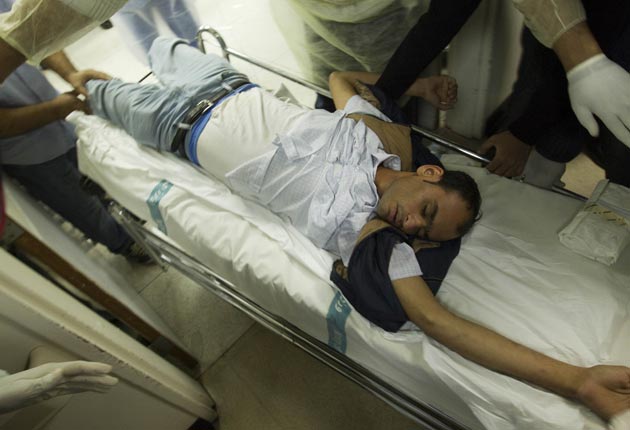Crackdown on arms exports to Bahrain

The government bowed to intense pressure last night and revoked a host of licences for arms exports to Bahrain and Libya, after Foreign Secretary William Hague said there was "no evidence" that security forces in the Gulf state had used British tear gas to suppress pro-democracy demonstrators. The French government has banned all arms exports to Bahrain and Libya.
Britain and other Western countries have urged restraint in the protests sweeping across the Middle East. But at the same time, the UK has been selling arms and crowd-control measures to the administrations in Bahrain, Libya, Jordan and other countries.
Mr Hague said yesterday there was "no evidence" that UK-made tear gas had been used against protesters in Bahrain, where several people have been killed in clashes with the security forces. The Foreign Office declined to expand on Mr Hague's comments, but did not suggest there was any evidence that UK-made tear gas had not been used.
The Foreign Office revoked 24 licences used by individual firms to export to Bahrain, as well as a further 20 open permits. A further eight licences for arms exports to Libya have also been stopped. The barred licences are understood to be linked to crowd-control measures. Other licences in the region are also under review.
Alistair Burt, the Foreign Office minister responsible for the Middle East, said: "We are deeply concerned about the situation in Bahrain and the events which have led to the deaths of several protesters." The Foreign Secretary had said earlier that the Government "does not sell materials to other countries that are likely to be used for internal repression".
But in the third quarter of last year, the Department for Business approved licences for the export of "crowd-control ammunition" to Libya and combat helicopters to Algeria. Authorities in both countries have violently cracked down on peaceful demonstrations in recent weeks.
The New York-based Human Rights Watch said its sources inside Libya had reported that security forces had killed at least 24 people over the past two days. Exile groups have given much higher tolls.
Last week, on a tour of the Middle East, Mr Hague praised the efforts of the administration in Bahrain. In Manama, the Foreign Secretary said he had had "very productive discussions about foreign and security issues in the Middle East, where Britain and Bahrain have many common interests and indeed many common opinions and approaches".
The British Government has forged strong trade links with Libya since it came in from the diplomatic cold after agreeing to pay compensation to the families of the victims of the Lockerbie bombings. Since the Coalition Government came to power last May, licences have been issued for the sale of tear gas, small-arms ammunition, military vehicles and thermal-imaging equipment.
The Government has put commercial ties at the heart of Britain's foreign policy since taking office, a point underscored by a UK Trade and Investment delegation of as many as 15 officials at this weekend's IDEX arms fair in Abu Dhabi. Defence minister Gerald Howarth will also be present, supporting nearly 100 British arms and security firms.
Adam Thomas, a spokesman for UKTI, claimed that Britain had the most "stringent conditions" on arms exports anywhere in the world. He also gave a specific undertaking that none of the British companies exhibited at the fair would be selling, promoting or displaying tear gas.
Denis MacShane, a former Labour Foreign Office minister, who raised the issue of UK exports to Bahrain in a Commons question to Mr Hague on Thursday, said yesterday: "A review is just Whitehall vocabulary for the fact that nothing will happen. It is extremely sad to hear these weasel words about a review. What we actually need is an immediate suspension to all arms sales across the region."
Mr McShane's comments were echoed by anti-arms trade group, CAAT. "It is astounding that the Government is still insisting it has a responsible arms export policy while, in the same breath, admitting that it was happy to supply authoritarian regimes with the means to crush dissent," said Sarah Waldron, campaigns co-ordinator at CAAT.
Oliver Sprague, arms programme director of Amnesty International, said: "After what we've seen in Bahrain's Pearl roundabout, it looks as if the Government's risk-assessment system has been found wanting. There must be much tighter checks when arms and security equipment is being despatched in cases like this."
Subscribe to Independent Premium to bookmark this article
Want to bookmark your favourite articles and stories to read or reference later? Start your Independent Premium subscription today.

Join our commenting forum
Join thought-provoking conversations, follow other Independent readers and see their replies